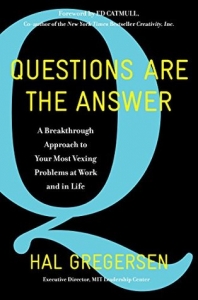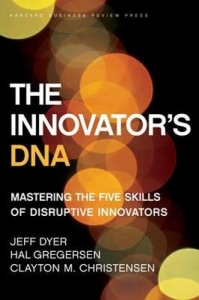Every problem or issue raises new questions, which must be correctly answered in order to address the problem or resolve the issue. What if we could get a better answer to our most troublesome problem—at work or at home—just by altering the question? If asking right questions is essential for creative problem solving and innovation, and for effective leadership, shouldn’t we know more about how to arrive at right questions? In his book “Questions Are the Answer: A Breakthrough Approach to Your Most Vexing Problems at Work and in Life” Hal Gregersen gives many examples of people who had used questions in specific ways to solve problems. He gives many examples of how managers have used questioning in a variety of ways to obtain better results and provides additional information sources on key topics for those who want to dig deeper. In this episode of Bridging the Gaps I speak with Hal Gregersen.
Hal Gregersen is a senior lecturer in leadership and innovation at MIT Sloan School of Management. He is a former executive director of the MIT Leadership Center and a cofounder of the Innovator’s DNA consulting group. He is a prolific author and a motivational speaker, and has helped leaders around the world to create cultures of fearless inquiry and to transform their organizations into innovative powerhouses. He is one of the authors of “The Innovator’s DNA: Mastering the Five Skills of Disruptive Innovators” a book cited by managers, creative problem-solvers and leaders around the world as a highly recommended read for anyone interested in innovation.
I open the discussion by asking Hal Gregersen about the evolving and ever changing landscape of leadership. We then discuss catalytic and recursive questions. How to learn to ask the right questions is essential for creative problem solving; we discuss this.
Although the primary focus of this discussion is on Gregersen’s book “Questions are Answer: A Breakthrough Approach to Your Most Vexing Problems at Work and in Life”, we do touch upon the book that he co-authored “The innovator’s DNA: Mastering the five skills of disruptive innovators”. I ask him to outline, compare and rate these five skills of disruptive innovators. We then discuss how leadership should evolve in this age of “working from home”. Finally I ask him for tips and suggestions for our young listeners and for future leaders; what skills they should acquire so that they are ready to meet future challenges. This has been a fascinating and highly informative discussion.
Complement this discussion with Growth Mindset: A Must Have Tool for Success with Professor Carol Dweck and then listen to Multiple Intelligences, Future Minds and Educating The App Generation: A discussion with Dr Howard Gardner








Connect With Us